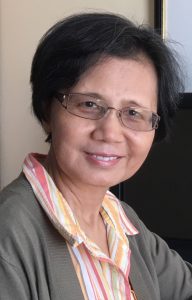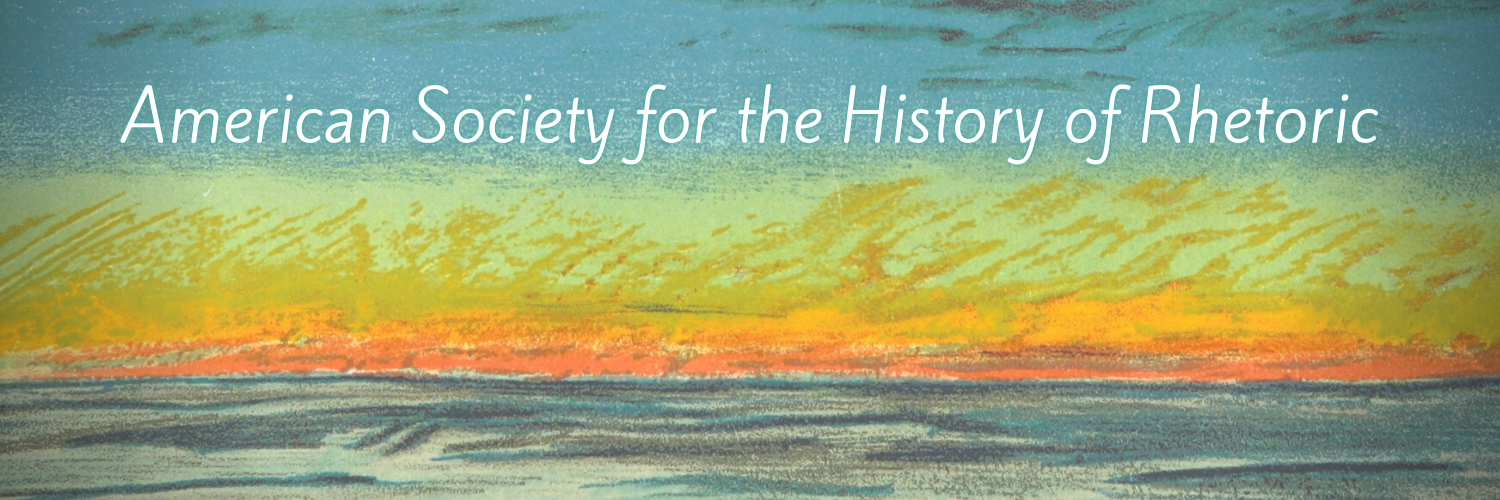News from ASHR
ASHR Interview: Cory Geraths on Reception History and Queer and Feminist Historiography
In this ASHR interview, I speak to Dr. Cory Geraths about his interest in reception history and queer and feminist historiographical methods. Dr. Geraths is Visiting Assistant Professor of Rhetoric at Wabash College. His research areas include classical rhetoric, rhetorics of gender and sexuality, Christian rhetoric, rhetorical historiography, and rhetorical pedagogies.
JL: Thanks for agreeing to be interviewed, Cory. While we have both been a part of ASHR for a few years, I’ve never had the chance to learn about how you became interested in your current research projects: I appreciate having that chance now! Can you tell me about how you became interested in the history of rhetoric? What initially drew you to the field?
 CG: While completing my graduate degrees in Rhetoric at Penn State, I had the pleasure of taking courses from some of the foremost scholars in the history of rhetoric. Courses in feminist rhetorical history and historiography with Cheryl Glenn, on classical rhetoric with Michele Kennerly, and public memory with Stephen Browne (to name just a few examples) introduced me to the diversity of texts, methods, and questions that undergird scholarship on rhetoric’s histories. While these classes began to fashion my interest in the history of rhetoric, it was not until a series of research collaborations with Michele Kennerly—my doctoral adviser—that I became truly enraptured by the feminist power of historiographic recovery and the splendor of reception histories. The second of these projects was an expansion and extension of feminist rhetorical scholars’ recovery of Aspasia, a 5th-century BCE rhetor and pedagogue. Our essay, “Painted Lady: Aspasia in Nineteenth-Century European Art” (Rhetoric Review 35.3, 2016), explored Aspasia’s reception and diverse rhetorical depictions in British and French painting and lithography. This experience studying Aspasia—and coming to see her rhetoric in a new light via the multimodal media of art—was particularly instrumental in solidifying my commitment to the history of rhetoric.
CG: While completing my graduate degrees in Rhetoric at Penn State, I had the pleasure of taking courses from some of the foremost scholars in the history of rhetoric. Courses in feminist rhetorical history and historiography with Cheryl Glenn, on classical rhetoric with Michele Kennerly, and public memory with Stephen Browne (to name just a few examples) introduced me to the diversity of texts, methods, and questions that undergird scholarship on rhetoric’s histories. While these classes began to fashion my interest in the history of rhetoric, it was not until a series of research collaborations with Michele Kennerly—my doctoral adviser—that I became truly enraptured by the feminist power of historiographic recovery and the splendor of reception histories. The second of these projects was an expansion and extension of feminist rhetorical scholars’ recovery of Aspasia, a 5th-century BCE rhetor and pedagogue. Our essay, “Painted Lady: Aspasia in Nineteenth-Century European Art” (Rhetoric Review 35.3, 2016), explored Aspasia’s reception and diverse rhetorical depictions in British and French painting and lithography. This experience studying Aspasia—and coming to see her rhetoric in a new light via the multimodal media of art—was particularly instrumental in solidifying my commitment to the history of rhetoric.
ASHR Interview: Caroline Koons on Harmony and Rhetoric
In this latest ASHR interview, I speak with PhD Student Caroline Koons (Pennsylvania State University). Caroline studies the intersections of music and politics through a rhetorical lens. Her current research focuses on the uptake, circulation, and appropriations of popular American songs as they interact with religion, war, race, gender, and labor. Her writing on the “Battle Hymn” is published in the Southern Journal of Communication. She currently teaches Effective Speech and served as Editorial Assistant for Rhetoric & Public Affairs from 2013-2015.
Jordan Loveridge: Thanks so much for agreeing to do this interview, Caroline! To start, can you tell me about how you became interested in the history of rhetoric? What initially drew you to the field, and how would you describe your main research areas?
 Caroline Koons: I was fascinated by history for most of my life, largely because it was so easy to get lost in the stories that people tell and pass on to others. In college I had a freshman seminar in rhetoric and politics, and talking to the professor (Dr. Jean Dehart), I expressed irritation with not being able to choose between writing, history, and communication. She suggested, much to my eternal gratitude, that rhetoric might be a field where I could do all three together. I liked it so much that I decided to pursue graduate school in rhetoric where I discovered I could fold in another one of my passions: music. Initially I was a straight up public-address person but I had a hard time ignoring the sound of people’s voices as a component in their ability to persuade and the songs that often accompanied platform orations. I started out with a seminar paper tracing the change in the Battle Hymn of the Republic and ended up expanding into my thesis and first publication. Since then I’ve taken a deep dive into sonic rhetoric and its immense overlaps throughout the history of rhetoric.
Caroline Koons: I was fascinated by history for most of my life, largely because it was so easy to get lost in the stories that people tell and pass on to others. In college I had a freshman seminar in rhetoric and politics, and talking to the professor (Dr. Jean Dehart), I expressed irritation with not being able to choose between writing, history, and communication. She suggested, much to my eternal gratitude, that rhetoric might be a field where I could do all three together. I liked it so much that I decided to pursue graduate school in rhetoric where I discovered I could fold in another one of my passions: music. Initially I was a straight up public-address person but I had a hard time ignoring the sound of people’s voices as a component in their ability to persuade and the songs that often accompanied platform orations. I started out with a seminar paper tracing the change in the Battle Hymn of the Republic and ended up expanding into my thesis and first publication. Since then I’ve taken a deep dive into sonic rhetoric and its immense overlaps throughout the history of rhetoric.
ASHR Interview: Lucy Xing Lu on Chinese Rhetorical Traditions
In this latest ASHR interview, I speak to Dr. Lucy Xing Lu about her upcoming keynote at the ASHR Symposium on Diversity and Rhetorical traditions, as well as her past publications on Chinese rhetorical traditions. Dr. Lu received her PhD in Rhetoric and Communication from the University of Oregon. Lu’s academic interests include Chinese rhetoric, comparative rhetoric, intercultural/multicultural communication, language and culture, cultural identity, and Asian American communication.
Jordan Loveridge: Thank you for agreeing to this interview–I’m excited to get a sneak peek at your keynote before the Symposium itself. Before we get to that, though, can you tell me about how you became interested in the history of rhetoric? What initially drew you to the field?
 Lucy Xing Lu: I become interested in the history of rhetoric when I was completing my doctoral program at the University of Oregon. I took a number of classes on the history of rhetoric and rhetorical theories from my professors. But after my first year in the program, I realized all we had read and learned in the readings were western rhetoric. Some scholars even claimed that rhetoric is only the property of the West. With curiosity and eagerness to find out if such claims were true, I began to read classical Chinese works and look for “Chinese rhetoric” or senses of rhetoric. I chose to do my dissertation on comparing ancient Chinese rhetoric and classical Greek rhetoric and later expanded it into a book titled Rhetoric in Ancient China, Fifth to Third Century B. C. E.: A Comparison with Greek Rhetoric published in 1998 by the University of South Carolina Press.
Lucy Xing Lu: I become interested in the history of rhetoric when I was completing my doctoral program at the University of Oregon. I took a number of classes on the history of rhetoric and rhetorical theories from my professors. But after my first year in the program, I realized all we had read and learned in the readings were western rhetoric. Some scholars even claimed that rhetoric is only the property of the West. With curiosity and eagerness to find out if such claims were true, I began to read classical Chinese works and look for “Chinese rhetoric” or senses of rhetoric. I chose to do my dissertation on comparing ancient Chinese rhetoric and classical Greek rhetoric and later expanded it into a book titled Rhetoric in Ancient China, Fifth to Third Century B. C. E.: A Comparison with Greek Rhetoric published in 1998 by the University of South Carolina Press.
